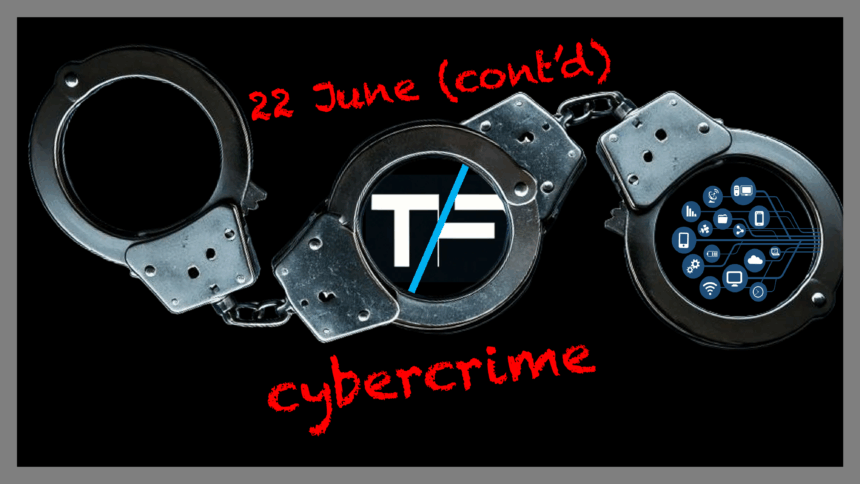There a bit more cybercrime news on the day…. Cyber threats continue to shake the digital world, with new threats emerging every day. From insurance hacks to vast leaks of login credentials, the stakes are higher than ever for companies and individuals alike. This TF update captures additional cybercrime events making waves today. Here’s what you need to know to stay protected.
What’s Happening & Why This Matters
Insurance Giant Aflac Faces Sophisticated Cyberattack
Insurance leader Aflac recently reports a cyberattack exposing sensitive client data, including Social Security numbers and health records. The breach is part of a wider spree targeting the US insurance sector. The FBI and cybersecurity experts suspect a young hacking collective known as Scattered Spider. This group uses social engineering techniques, such as impersonating tech support, to infiltrate company networks.

Aflac quickly contained the intrusion and confirms no ransomware was deployed. Despite the swift response, the breach’s scope remains unclear, and customers remain vigilant. Cybersecurity veterans warn companies to train employees against suspicious calls and maintain strong defenses.
Cynthia Kaiser, former FBI Cyber Division deputy assistant director, warns, “If Scattered Spider targets your sector, act fast. They complete attacks in hours, unlike other groups that take days.” Google’s chief analyst John Hultquist adds, “These hackers cause real-world disruptions now. They are the threat that keeps cybersecurity teams awake.”
Pope Leo XIV Urges Ethical AI Development

At the Vatican, Pope Leo XIV calls for AI development that respects human dignity, intellect, and spirituality. Speaking to tech executives from firms like Google, OpenAI, Meta, and IBM, he stresses the need for AI ethics centered on the well-being of individuals, especially children.
The Pope cautions against confusing data access with true intelligence and warns that AI could harm children’s intellectual growth. He references past Vatican efforts, such as the Rome Call for AI Ethics, which outlined principles for responsible AI use.
Pope Leo draws on historical church teachings, linking AI’s rise to the industrial revolution’s social challenges. He urges technology leaders to create AI that serves justice, labor rights, and human dignity. The Vatican’s push for ethical AI governance arrives amid debates over relaxing AI regulations in the US.
Massive Exposure of 16 Billion Login Records
Security researchers at Cybernews reveal a leak of 16 billion login records. The data comes from “infostealers” and historic breaches. Although the datasets were briefly exposed and likely overlap, the breach highlights the enormous volume of credentials available to hackers.
The compromised accounts cover services like Facebook, Apple, and Google. Google emphasizes the data doesn’t stem from their own breach and recommends using tools like password managers and multifactor authentication.
Experts stress the need for regular password updates and layered security to combat credential theft. Peter Mackenzie of Sophos says this leak “shows the depth of information cybercriminals access.” Toby Lewis of Darktrace warns that infostealers scrape browser data, urging good security hygiene.
China Centralizes Online Identity with Virtual ID
China announces a new centralized national internet ID system that tightens online controls dramatically. Instead of verifying identities separately on each platform, users can now sign in across social media and websites with one state-issued virtual ID. This policy, set for rollout in mid-July 2025, claims to enhance data security and support the digital economy.
Experts worry this system deepens China’s digital surveillance and censorship. Xiao Qiang of UC Berkeley calls it “an infrastructure of digital totalitarianism,” capable of real-time monitoring and silencing users across multiple platforms instantly. Advocacy group China Human Rights Defenders warns it gives authorities sweeping power to track digital footprints from “point zero.”

Since 2012, China has increased online censorship, removing posts and suspending accounts swiftly to quell dissent. The new virtual ID system may expand this reach, making anonymity nearly impossible and further restricting freedom of expression.
Despite official claims that registration is voluntary, experts expect the system will become mandatory through incentives or restrictions. Concerns over data breaches rise as centralized personal information creates attractive targets for hackers. A notable 2022 leak exposed data of a billion citizens from a police database, showing the risks.
Chinese state media portrays the internet ID as a “bullet-proof vest” for personal data. Over six million users already registered, with the government encouraging industries to integrate the system.
This development signals China’s tightening grip on digital freedom, raising alarms among global human rights advocates.
TF Summary: What’s Next
Cybercrime and digital control escalate worldwide, from Aflac’s breach and massive credential leaks to China’s centralized internet ID system. Organizations must strengthen defenses and remain alert to social engineering and data vulnerabilities.
The Vatican’s call for ethical AI governance reminds the tech world that rapid innovation must respect human dignity. Meanwhile, China’s internet ID system raises urgent questions about privacy and freedom in the digital age.
Staying informed and proactive helps individuals and organizations navigate these complex cyber challenges.


